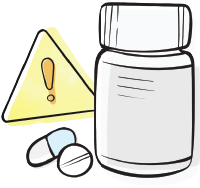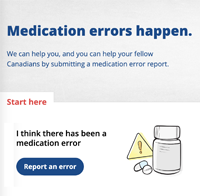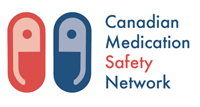Knowledge is Power: Informed Consumers Prevent Medication Errors
Part 1 of a 3-Part Series
2024-04-23
-

The team at MedError.ca reviewed medication error reports submitted by consumers or their care partners in the last 5 years. Most of the reports included in the analysis described a need for better information sharing and communication among consumers, care partners, and health care providers. In this 3-part newsletter series, learning from the analyses will be shared. Each newsletter describes a different topic to support consumers in getting better information and experiencing better communication with health care providers.
This first newsletter is about the power of an informed consumer or caregiver. Consumers have a role in protecting themselves and their loved ones from harms related to their medications. Consumers who are knowledgeable about their medications are better able to prevent or catch medication errors.
MedError.ca received a report about a parent whose child needed an antibiotic to treat an infection. Before leaving the hospital, the parent took steps to learn the name and dose of the prescribed antibiotic. After receiving the medication from the pharmacy, they read the label on the antibiotic bottle and noticed that although the dose (amount) matched the prescription, the bottle contained a different antibiotic than expected. The parent told the pharmacist, who then provided the correct medication. The mix-up happened because the medications had similar names. Taking the wrong antibiotic could have caused the child's infection to worsen.
-

The following tips can help you be better informed about your medications:
-
Use the 5 Questions to Ask About Your Medications or the 5 Questions to Ask About My Medicine - For Kids to get important information.
-
◦ For example, ask these questions: What is the name of the medication and what is it used for? What is my dose, and how do I take it? Do I need any follow-up?
-
◦ Keep an up-to-date list of your medications and share it with your health care team.
-
Understand the information provided in your prescription. A previous newsletter describes how to read a prescription.
-
Look for reliable information on websites from trustworthy organizations, like the following:
-
◦ Government agencies, such as Health Canada, the Public Health Agency of Canada, provincial/territorial ministries of health
-
◦ Disease-related organizations (e.g., Canadian Diabetes Association)
-
◦ Health care organizations and hospitals
-

Share your experience about a medication error, or a story about a good catch at
mederror.ca. Your experiences help to inform future improvements in medication safety.
Join the Canadian Medication Safety Network! Be part of the medication safety conversation with health care providers and fellow consumers.
This newsletter was developed in collaboration with Best Medicines Coalition and Patients for Patient Safety Canada.
Recommendations are shared with healthcare providers, through the ISMP Canada Safety Bulletin, so that changes can be made together.
|

